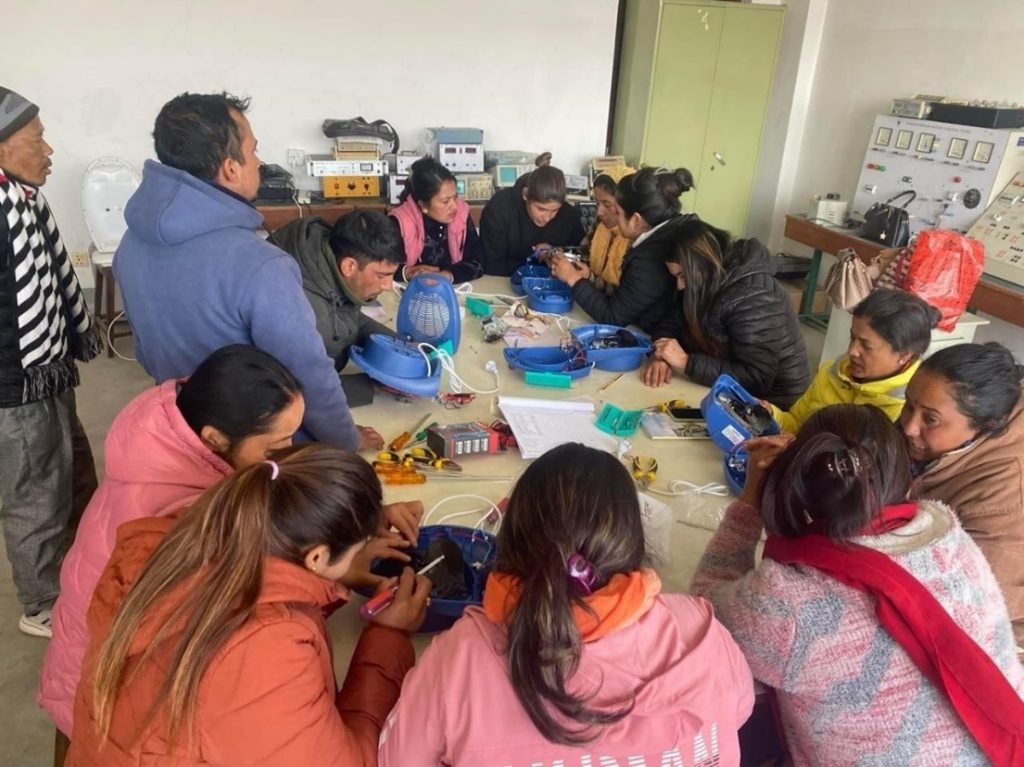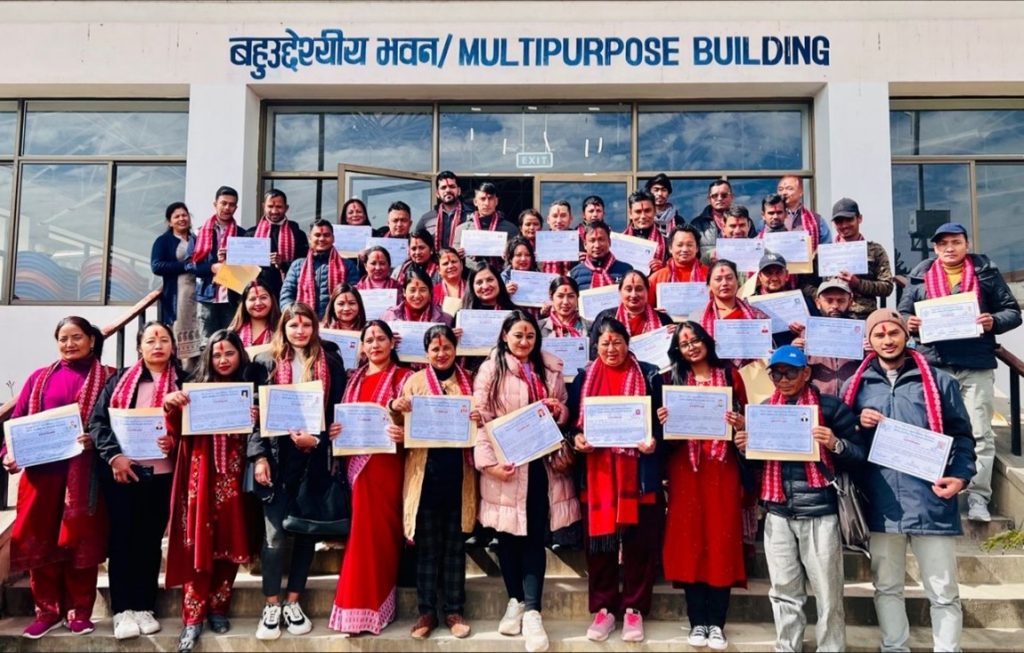
- Date
- 14th March 2024
- Categories
- eCooking
By Richard Sieff (Gamos Ltd, MECS), Mrs. Srijana Poudel (WACN), Dr. Chandrashekhar Singh (WACN), Dr. Ashutosh Sharma (WACN).
Improving access to local repair services for electric cooking (eCooking) appliances is crucial for building consumer confidence and supporting scaled eCooking transitions. In Nepal, this issue is widely regarded as a major challenge for promoting eCooking outside of urban centres as evidenced by four MECS pilots which found households in rural and peri-urban areas faced lengthy turnaround times and expensive transportation costs for repairs (even under warranty). These issues undermined confidence in eCooking as households feared repairs would not be possible or challenging and led to some households not using eCooking appliance as much as they would like. However, addressing this issue would seem to open up multiple possible benefits as fostering local repair solutions should create economic opportunities for those providing repair services and also for appliance retailers whose sales may increase as consumer confidence grows.
This win-win scenario was central to the recent eCooking repair course run by the Women Awareness Centre Nepal in Banepa (Kavre district), which specifically targeted creating new opportunities for learning, employment, and income generation to help improve livelihoods. The training formed part of WACN’s MECS funded Sparking the Cooking Supply Chain (SC2) challenge fund project, which seeks to develop an eCooking supply chain through WACN’s network of women’s Saving and Credit Co-operatives (SACCOs) and distribute an initial 1,800 eCookstoves to households in areas where the SACCOs operate. The course was provided to 44 SACCO members by Nepal Banepa Polytechnic Institute (NBPI)1 and aimed to enable trainees to provide eCooking repair services in their SACCOs areas being targeted by the SC2 distribution.
Developing a course
As requested by WACN, the course was specially designed by NBPI to create new economic opportunities for trainees potentially lacking previous repair experience. Aligning with Council for Technical Education and Vocational Training (CTEVT) guidelines, a 90 hour course was developed although WACN requested that the course was delivered in 18 days (5 hours per day) rather than the usual 30 days (3 hours per day) to reduce the burden on trainees who needed to travel and/or spend time away from their existing responsibilities. The course contained some theory but primarily focused on practical hands-on training (involving participants carrying out repairs on different appliances) in order to better prepare trainees for future work. On completion, a formal ceremony saw trainees receive a course completion certificate awarded by NBPI. As a government registered training institute, NBPI issuing the certificate provides additional validity to the training which may help future work prospects.

Trainee profile and course content
The 44 trainees were made up of an equal number of men and women selected by the SACCOs. The initial intention had been for all 44 trainees to be women but the SACCOs reported difficulties in finding sufficient female participants. The participants’ backgrounds were varied, some with previous experience of technical repair while others were complete beginners. Most were from SACCOs in the Kavre area although four from Kathmandu based SACCOs showed notable dedication by travelling 3 hours each day to reach the training in Banepa. Only one trainee had a job, supporting the overarching aim of providing new income generating opportunities in the SACCO communities. Course, refreshments, and travel costs were covered by WACN.
The training was a crash course on eCookstove system design, with much of the course content and skills learnt (e.g. circuit design, soldering, replacing fuses) transferrable to other non-motorised appliances – therefore potentially broadening work opportunities for trainees. The course was brand agnostic as per government training institute guidelines and all common eCooking appliances were covered, namely: EPCs, induction stoves, infra-red stoves, rice cookers, kettles, water heaters, and mixers. Covering multiple brands and devices was informed by WACN’s SC2 project which found community members would lack confidence in repair technicians who could only repair certain devices2.


Phase two: bespoke EPC training
The course is the first part of a two-step training process. Next month, the trainees will travel to Kathmandu to receive training on repair of Philips EPCs; the main product being distributed via the SC2 project. The training will be developed and delivered by Syakar Company Ltd (the authorised Philips distributor and retailer for Nepal) for whom the initial Banepa Polytechnic course was a pre-requisite for permitting relatively inexperienced trainees to carry out repairs on Philips EPCs, one of the more expensive EPC models in Nepal. Lasting 3-4 days, the training will focus on reported issues previously documented by Syakar although trainees will be restricted from working on components requiring specific Phillips authorisation (e.g. particular circuit boards). On completing the course, trainees will be certified to carry out certain repairs on Philips EPCs and will be issued with job cards to claim compensation from Syakar for repairs carried out. The use of job cards is important to help ensure only certified trainees carry out repairs and that pricing of repairs is consistent and transparent.
Course evaluation: successful completion sparks knock-on benefits
The initial course was considered highly successful by Banepa Polytechnic. All 44 participants passed and there were no drop outs, a common feature of other vocational courses. During the course, trainee-to-trainee support was a notable feature. Less experienced members of the cohort were often supported by more experienced trainees who were also quick to point out course benefits. One more experienced trainee highlighted that thanks to the course he now realised that he had been carrying out previous wiring work incorrectly. Overall, trainee feedback was positive. Many requested a longer three-month course to learn even more. Critically, the course has already begun to achieve the multiple knock-on benefits envisioned, with WACN reporting the training has provided additional incentives for future eCookstove sales by increasing consumer confidence in eCooking in the areas where the trainees are based.

Next steps and increasing outreach
To increase outreach, the training course will be documented to enable its use by other training providers in Nepal and beyond, while a longer term aim is to integrate the course within the existing broader home appliance curriculums of vocational institutes. Both these aims could also potentially be incorporated into the future activities of the Global Electric Cooking Coalition (GeCCo) to accelerate wider dissemination and support scaled eCooking transitions.
……………………………
Featured image, top: Trainees carrying out repairs on eCooking appliances (image credit: WACN, 2024).
- NBPI are a government registered training institute and constituent institute of the Council for Technical Education and Vocational Training (CTEVT).
2. The WACN job card approach shares some similarities with suggestions by others in Nepal that eCooking appliance sales could be bundled with tokens for repair services that would only be redeemable with certain vetted vendors/local technicians.